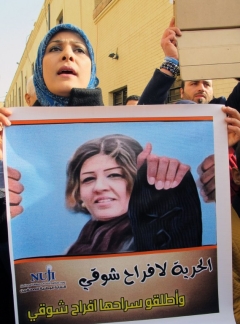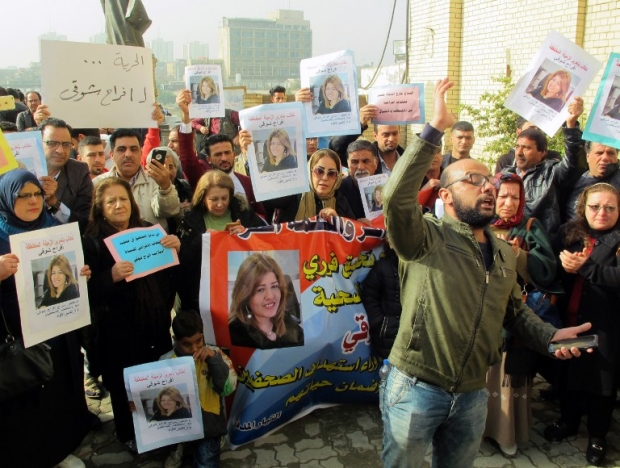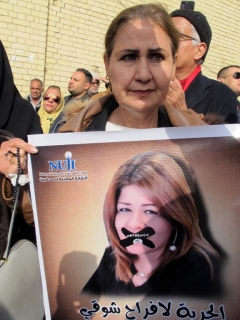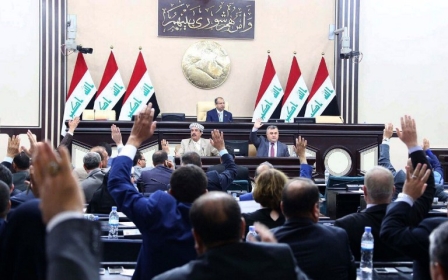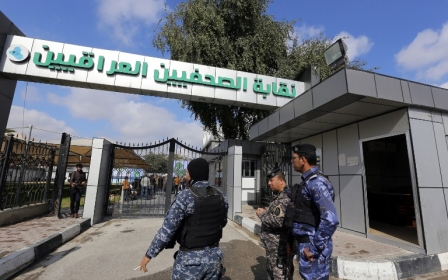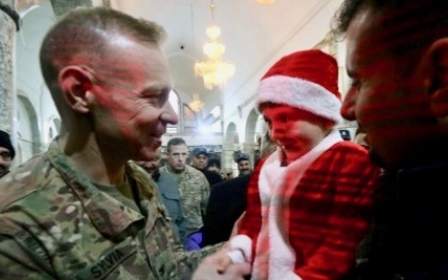Criminal kidnappings are big business in Baghdad
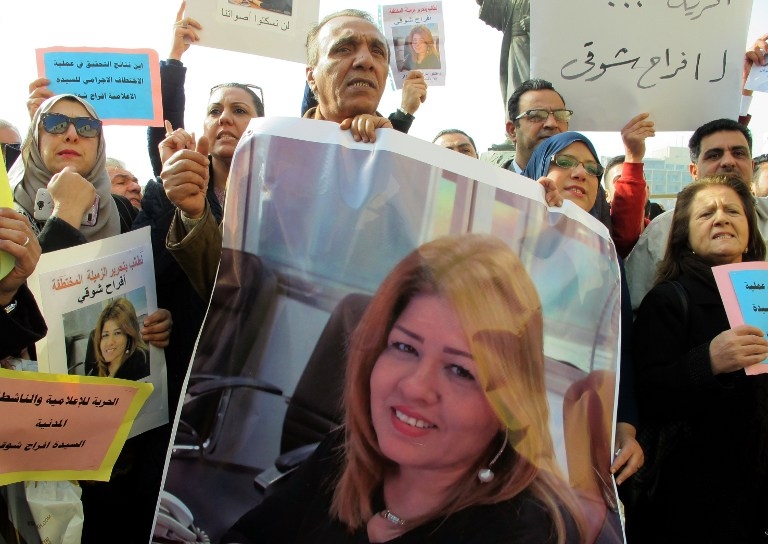
BAGHDAD - While much of Iraq was celebrating the end of 2016, Nibras, the younger sister of kidnapped Iraqi freelance journalist Afrah Shawqi, was desperately waiting to get any news of her fate.
Afrah, a mother of two young boys, was kidnapped from her home in southern Baghdad by between eight and 15 gunmen late on 26 December. The kidnappers forced Afrah to go with them after they took some money, laptops and mobile phones. They also left with her private car.
Since then, the Iraqi security authorities and her family have given little in the way of information relating to the investigations into the kidnapping.
"Time has stopped since the masked gunmen forced Afrah to leave with them. Our hearts have been hanging on for the mobile phone to ring since then, and we do not know how this nightmare will end," Nibras told Middle East Eye.
"Afra's boys, Yossif [13 years old] and Younis [10 years old], have been asking me about her every few minutes. They ask if she will come back soon. I have no answer to this," Nibras said.
Afrah Shawqi, 42, is a freelancer reporter who writes for a number of Arabic and local news websites, including Aklaam.
Her abduction is only the most recent of numerous kidnappings - politically and criminally related - that take place almost daily in Baghdad. The number has recently increased for criminal reasons, Iraqi officials said.
Iraqi Prime Minister Haider al-Abadi in his weekly press conference on Tuesday indicated that there has been a "relative increase" in the "scale of the kidnapping" carried out by "organised crime [gangs]".
Iraqi security officials reached by MEE refused to give any specific numbers for the criminal abductions in Baghdad, but a source with access to Interior Ministry records told MEE these show 745 registered instances of kidnapping in the capital in the first nine months of 2016.
A further 30 non-registered kidnappings were known to the police for the same period; in these, the families of the victims did not officially inform the security authorities as by keeping quiet "they believe that they would maintain the lives of their kidnapped relatives," the source said.
General Haider Fakhri, the director of the Combating Crime Department in Baghdad, denied that there were over 700 abductions in Baghdad in the first nine months of 2016.
He declined to give any statistics for the number of kidnappings over the period, while denying there had been an increase in abductions in the past three months.
"Under the exceptional circumstances in the country, they [the number of abductions] have dropped," Fakhri told MEE. "There is just an increased rate of one or two cases this month."
Like Fakhri, other security officials reached by MEE either had no specific statistics for the number of abductions or declined to provide any numbers for the past three months, but they acknowledged there had been an increase in this kind of crime.
Baghdad's Provincial Council, which supervises the city's local government, said its records indicate there were 25 registered kidnappings in Baghdad just in December and "more than that number were not registered," Riyadh al-Aadhadh, the head of the council told MEE.
Kidnapping gangs in a war-torn country like Iraq can be either criminally or politically motivated. "The criminal ones aim to blackmail [people] to get money, and the terrorist [political] type aims to impose [the gang's] influence and blackmail [people] at the same time," former Iraqi interior minister Mohammed al-Ghabban told MEE.
The criminal gangs, which according to officials are now widely operating in Baghdad, aim to extort ransoms ranging from $10,000 to $100,000, depending on the financial situation of a victim's family. The Baghdad kidnappings in December were mostly criminal, security and local officials told MEE.
Among those taken recently was Ali al-Khafaji, a 14-year-old teenager abducted last week from the family home in Karrada, one of Baghdad's more up-market neighbourhoods. The kidnappers demanded 50 million dinars ($41,000) to release him.
Ali's parents did not hesitate and rushed to pay the required ransom. A day later, Ali's body was found dumped in nearby sewage.
"Often, the abductees were kids and they were killed [by the abductors] after the ransoms were paid," Provincial Council head Aadhadh told MEE.
The map of kidnappings
Baghdad has been divided into Shia and Sunni neighbourhoods since 2006-2008, when the civil war was at a peak and tens of thousands of Iraqis were being slaughtered based on their religious sect. These neighbourhoods are surrounded by blast walls and their limited access points are under the control of Iraqi security forces.
Even with such controls, Shia militias, Sunni radical fighters and criminal gangs from both sides are able to move in and out and carry out all kinds of attacks.
"All these gangs are taking advantage of the weakness of the state and the law, and some of them are using the names of the armed [Shia] factions [to get facilities]," Ghabban said.
Afrah Shawqi's kidnappers had used three pick-up vehicles without license plates, police said. The vehicles had entered Baghdad's southern Sunni majority neighbourhood of Saydiya, which is totally surrounded by blast walls and has its two access points controlled by the federal police.
"You have to get help from inside if you want to operate freely inside a closed neighbourhood like Saydiya," the official said.
The official and many other security officials familiar with the investigations related to Shawqi's kidnapping declined to give any information that might identify the kidnappers or their motivation.
"We cannot say everything. Afrah's life is at stake. All that can I say is Afrah was kidnapped by a Shia gang, and we are doing our best to safely release her," the official, said.
Shia gangs behind kidnappings
In 2016, most criminal kidnappings in Baghdad took place in Rusafah, a Shia-dominated part of Baghdad on the eastern bank of the Tigris river and home to numerous banks and finance and investment companies. Here, wealthy Shia families live just a few blocks away from Shia slums, officials said.
Several key security officials told MEE that the abductees and their abductors were mainly Shias in 2016, and some 90 of them were criminally motivated, carried out by small Shia gangs split from Shia militias.
"Some of them are either supported by big Shia armed factions or take advantage of contacts with the security forces," a senior Iraqi security official who declined to be named told MEE.
Baghdad during recent years has witnessed dozens of political and criminal kidnappings carried out by Shia and Sunni gangs using Iraqi security badges and vehicles, Baghdad officials told MEE. General Fakhri did not deny the presence of security personnel who provide the required support for these gangs.
"The gangs are using all the available tools [to facilitate their movements]," Fakhri said. "All the kidnappers who we have detained admitted that they had got help from a soldier or a policeman. No senior officers" were involved in these crimes, Fakhri said.
Prime Minister Abadi has blamed parliament for the increase in abductions. He said at his weekly press conference on Tuesday that the amnesty law recently approved by parliament was behind the increase as the new law allows kidnappers to escape any legal consequences if "the abductee was not permanently harmed".
But Ghabban, strongly critical of the set-up of security forces before he resigned from office in July after the worst bomb attack in Baghdad for 13 years, drew MEE's attention to "the overlapping of security powers and the lack of coordination between the security agencies".
He said the factors behind his resignation had not been treated and the conditions he criticised then have led to the current deterioration in security, including the increase in abductions.
In an interview with Reuters before his resignation, Ghabban criticised the "disorder" plaguing Iraq's security apparatus. He said that security forces outside his control - including units reporting to two counter-terrorism agencies, two Defence Ministry directorates and regional security commands - overlapped with his ministry's own counter-intelligence efforts.
"With the continued confusion in handling security, the loss of the state's prestige, the spread of weapons outside the government's control, and the domination of the armed factions ... we cannot expect anything but continuing deterioration," Ghabban told MEE.
This article is available in French on Middle East Eye French edition.
New MEE newsletter: Jerusalem Dispatch
Sign up to get the latest insights and analysis on Israel-Palestine, alongside Turkey Unpacked and other MEE newsletters
Middle East Eye delivers independent and unrivalled coverage and analysis of the Middle East, North Africa and beyond. To learn more about republishing this content and the associated fees, please fill out this form. More about MEE can be found here.


